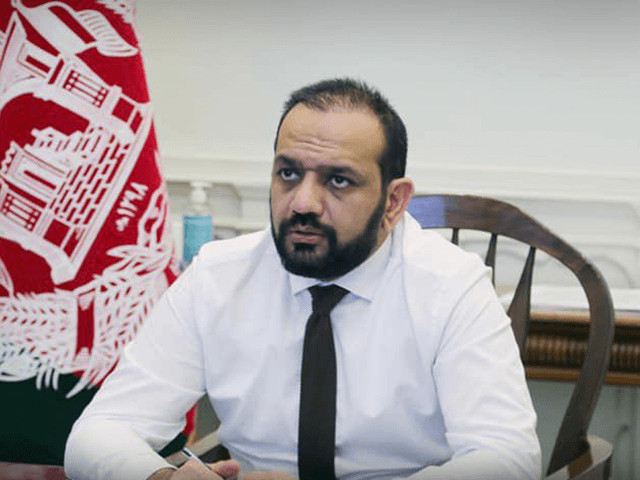Acting Finance Minister Khalid Payenda on Wednesday resigned his position with the government of Afghanistan and fled the country after the brutal Taliban insurgency gained control of vital border crossings and captured three more provincial capitals, bringing its total to nine.
Payenda announced he would resign with a Twitter post on Tuesday:
Today I stepped down as the Acting Minister of Finance. Leading MoF was the greatest honor of my life but it was time to step down to attend to personal priorities. I’ve put Mr. Alem Shah Ibrahimi, Deputy Minister for Revenue & Customs in charge until a new Minister is appointed.
— Khalid Payenda (@KhalidPayenda) August 10, 2021
A spokesman for the Finance Ministry said on Wednesday the minister “resigned and left the country because Afghanistan is grappling with declining revenues after the takeover of the custom posts” in areas captured by the Taliban.
The spokesman added that Payenda was concerned about the “deteriorating security situation” in Afghanistan, and felt this would be a good time to visit his sick wife. Bloomberg News reported Payenda is heading for the United States.
In the Twitter thread announcing his resignation, Payenda said he was proud of his accomplishments during his six months as finance minister, but expressed frustration with systemic corruption.
“I fired dozens of corrupt customs officers (but also found out that firing a few corrupt in a wholly corrupt ecosystem does not do much good),” he wrote.
In May, Payenda issued remarks to the Afghan Parliament stating that he had reason to believe government officials were embezzling $8 million a day. He cited Afghanistan’s customs as a particular problem, stating that 80 percent of its revenues go “to the mafia and the Taliban.”
Judging by the responses to Payenda’s resignation tweets, many Afghans view his departure as a sign that more of President Ashraf Ghani’s officials will abandon their posts and flee the country before the Taliban reaches Kabul. Some of the responses castigated Payenda for showing cowardice in the face of the enemy and weakening public morale by fleeing.
Deputy Minister for Customs and Revenues Alem Shah Ibrahimi will reportedly step in as acting finance minister until a permanent replacement is appointed.
Russian Defense Minister Sergei Shoigu, whose forces have been conducting joint exercises with Afghanistan’s neighbors in Tajikistan and Uzbekistan, said on Wednesday the Taliban has gained complete control of the borders with both countries. A European Union official estimated the Taliban now controls 65 percent of Afghanistan.
As of Wednesday morning, the Taliban held nine provincial capitals, a frightening avalanche of conquests after capturing its first capital on Friday. The latest captures include Faizabad, a city the Taliban did not even control when it ruled Afghanistan before the U.S. invasion; Badakhshan, which gives the insurgents control of valuable gold and lapis lazuli mines plus access to China and Pakistan; and Puli Khumri, which commands vital roads from Kabul to northern Afghanistan.
These Taliban advances created the financial crisis alluded to by the Finance Ministry when it confirmed Payenda’s resignation, wiping out much of the Kabul government’s revenue at the same time the Taliban’s advance dumps a tidal wave of impoverished refugees on the capital city. These conditions will increase pressure on Ghani’s government to surrender quickly once Taliban forces encircle Kabul.
Ghani himself arrived in Mazar-i-Sharif on Wednesday to rally his forces in the anti-Taliban bastion. He also sacked his army chief, Gen. Wali Mohammad Ahmadzai, and began talking with formerly ostracized local warlords Abdul Rashid Dostum and Atta Mohammad Noor, seeking their help in defending the crucial northern stronghold. Dostum was photographed boarding a plane in Kabul with a squad of commandos en route to Mazar-i-Sharif.
Afghan troops holding out in the provincial capital of Kunduz surrendered to the Taliban on Wednesday, handing over valuable Western military equipment to the insurgents. Some of the surrendering troops have reportedly joined the Taliban as fighters.

COMMENTS
Please let us know if you're having issues with commenting.